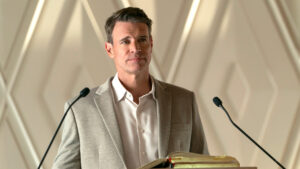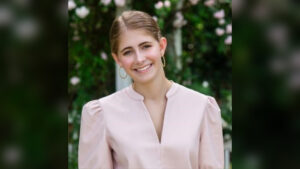The three years I spent in seminary were absolutely exhilarating: knee-deep in biblical languages and growing in an understanding of the majestic “big picture.” Though seminary in and of itself cannot change hearts, God tenderly chose to change my heart through this time of study. However, for those women in the church who want to be equipped to teach God’s Word without this experience, how can church leaders multiply themselves and facilitate theological training?
Many women whom I presently serve acknowledge a desire for serious study. Some are young mothers who hardly have the time to sit still for five minutes. I recently visited one of these young mothers, and while I was washing dishes her 4-year-old said, “Look, Mommy!” and licked the dirty kitchen floor. Who has the concentration for heavy reading when your son is in danger of ingesting a cockroach? Others are older women who speak of time “lost” since they did not prioritize knowing Christ through his Scriptures in their youth. Some work night and day to make ends meet. Though they feel strapped in one way or another, these women all long for intensive training.
Perhaps my context includes more women like this than yours, but undoubtedly many of us are hungry to grow and hungry to help others grow. Within the local church, how can we equip women who want theological training and raise them up to faithfully handle God’s Word as teachers?
The Good Deposit
While I do not pretend to have the definitive answers to these questions, I will share how we are addressing some of these needs in Baton Rouge among a few of our young women. This past year I approached four women in their 20s and 30s within our church who had expressed strong interest in communicating the mystery of the gospel to others. I asked each of them to consider being trained as a Bible teacher for the next five years.
When they agreed, we formed “The Good Deposit” and prayerfully developed a long-term vision: as bridesmaids attend the bride, we will serve Christ’s bride through biblical teaching (John 3.29). We began by reading two “big picture” books to firm up our foundation: Graeme Goldsworthy’s According to Plan and D. A. Carson’s The God Who Is There. These books were helpful personally and also showed us how to teach the very truths we were learning. We grew in the gospel message and began cultivating a gospel method of teaching God’s Word.
Below are a few practical questions we posed that enabled us to gain initial ground in this effort to be equipped for biblical teaching within the local church:
1. Are we in line with our church’s vision and mission?
Our church leadership fully supports our mission and financially supported each of these young women so they could attend The Gospel Coalition’s national conference in April 2011.
2. Are we practicing humility as young leaders looking to mature in godliness?
Because each of us is in our 20s or 30s, I have tried to link each of us up with older women in the faith. Training in gospel-centered content apart from training in a gospel-centered way of life often leads to being puffed up in vanity rather than being poured out in faithfulness.
3. Are our program goals realistic?
We have three young mothers in our group. If our goals were primarily short-term, they would probably either not be able to participate or they would commit to The Good Deposit to the exclusion of their regular Bible studies (which has the opposite intended effect by pulling them out of places of influence). We meet about once every two months and assign reading goals that are manageable for our lives. This is part of the beauty of a long-term vision: while we are narrowly focused, we are also patient.
4. Are we staying true to our practical mission of teaching others, or are we merely acquiring more knowledge?
As my pastor informs me (ironically?), often the best way to teach others is to show, not tell. We can talk about teaching until we are blue in the face, but the best way for us to learn to teach is . . . to teach! There are several ways we address this need. First, after The Gospel Coalition conference on Preaching Christ from the Old Testament I assigned each of us a passage from Numbers. A few weeks later we had 20 minutes each to teach our passage to one another. We all evaluated one another out loud and on paper. Though intimidating for some, this process was very fruitful. I chose Numbers because the women of our church will study Numbers this fall, so now these women are included in the teaching rotation, and we can immediately apply what we have learned. Furthermore, we have sought to plug into our church’s regular ministries to gain teaching experience by supporting existing ministry areas. For example, one of the women is now a sixth-grade confirmation teacher, and another has agreed to help teach the Bible at one of our area nursing homes.
5. Are we each attentive to God’s specific guidance?
We have different passions, areas of interest, and—let’s be honest—fears! Most of us do not want to teach large groups. We nuance our training such that our particular skills, gifts, and preferences are welcomed. Our diversity delights us since we know that God will send us to different places with the same reconciling message of Christ.
We pray that God would be pleased to take our feeble efforts, equip us to spread his fame, and multiply his transforming grace through us. May God also guide you, sustain you, discipline you, and grant you his heart for teaching this good news to a desperate world.
Free eBook by Tim Keller: ‘The Freedom of Self-Forgetfulness’
 Imagine a life where you don’t feel inadequate, easily offended, desperate to prove yourself, or endlessly preoccupied with how you look to others. Imagine relishing, not resenting, the success of others. Living this way isn’t far-fetched. It’s actually guaranteed to believers, as they learn to receive God’s approval, rather than striving to earn it.
Imagine a life where you don’t feel inadequate, easily offended, desperate to prove yourself, or endlessly preoccupied with how you look to others. Imagine relishing, not resenting, the success of others. Living this way isn’t far-fetched. It’s actually guaranteed to believers, as they learn to receive God’s approval, rather than striving to earn it.
In Tim Keller’s short ebook, The Freedom of Self-Forgetfulness: The Path To True Christian Joy, he explains how to overcome the toxic tendencies of our age一not by diluting biblical truth or denying our differences一but by rooting our identity in Christ.
TGC is offering this Keller resource for free, so you can discover the “blessed rest” that only self-forgetfulness brings.


































